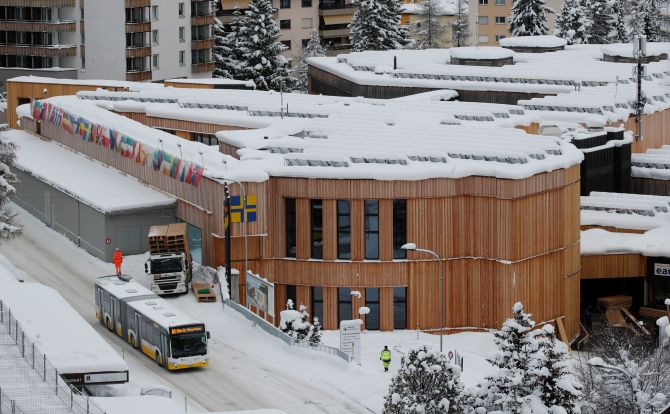 | « Back to article | Print this article |
The WEF meeting is crucial because of its theme encompassing globalisation at the time of rising nationalism and trade war, and the fourth industrial revolution due to rapid strides being made in robotics and artificial intelligence.

The impact of volatility in local politics is visible at the World Economic Forum (WEF) Annual Meeting, being organised in the Alpine Swiss town of Davos.
Prime Minister Narendra Modi is on the list of leaders of major economies - including US President Donald Trump, his French and Chinese counterparts Emmanuel Macron and Xi Jinping, respectively, and British Prime Minister Theresa May - to skip this year’s event, the theme for which is “Globalization 4.0: Shaping a New Architecture in the Age of the Fourth Industrial Revolution”.
Most ministers in the central government, too, are giving the annual meeting a miss, though last-minute participation from Commerce and Industry Minister Suresh Prabhu is expected.
Yet, India will be making its presence felt in Davos - around 140 corporate leaders, including Gautam Adani, Mukesh Ambani, Nandan Nilekani, N Chandrasekhar, Pawan Munjal, Anand Mahindra and G M Rao, will be attending the gathering between January 22 and January 25.
The corporate honchos will be joined in by state leaders.
The most prominent political leader from India will be Madhya Pradesh Chief Minister Kamal Nath, who has been a regular at Davos.
Punjab has made a surprising show with Finance Minister Manpreet Badal leading a compact delegation to invite investment in the state.
The Government of Punjab is keen to diversify its economic base by reducing its reliance on agriculture.
Andhra Pradesh CM Chandrababu Naidu, who has spent a lot of effort in marketing his state as a tech-savvy region, will be represented by his son Nara Lokesh, minister for IT and rural development.
Former Reserve Bank of India Governor Raghuram Rajan, New Development Bank president K V Kamath and IMF chief economist Gita Gopinath are also expected to be at Davos.
Even as local political issues kept global leaders at home (Trump because of the government shutdown, May due to the Brexit deal impasse and Macron for Yellow Vest protests), discussions at the WEF meeting would be crucial because of its theme encompassing globalisation at the time of rising nationalism and trade war, and the fourth industrial revolution due to rapid strides being made in robotics and artificial intelligence.
A survey of 10,000 people in 29 countries by the WEF on Globalisation 4.0 reflects rising nationalism and worries over the impact of technology.
Over 72 per cent of respondents say that collaboration between countries is the best way to mitigate isolationism.
About 57 per cent say that new immigrants are “mostly good” for the country while less than 50 per cent are unequivocal about benefitting from the advance of technology.
“With advances in robotics and artificial intelligence … we will have to move from a narrative of production and consumption toward one of sharing and caring,” says Klaus Schwab, founder and executive chairman of WEF.
“The changes that are underway today are not isolated to a particular country, industry, or issue. They are universal, and thus require a global response.”
Perhaps reluctantly business and political leaders are realising the perils of rising inequality and suspicion of technology caused by a skewed model of capitalism.
The WEF is making a distinction between globalisation and globalism.
“Globalisation is a phenomenon driven by technology and the movement of ideas, people, and goods.
"Globalism is an ideology that prioritises the neoliberal global order over national interests. Nobody can deny that we are living in a globalised world. But whether all of our policies should be ‘globalist’ is highly debatable,” he says.